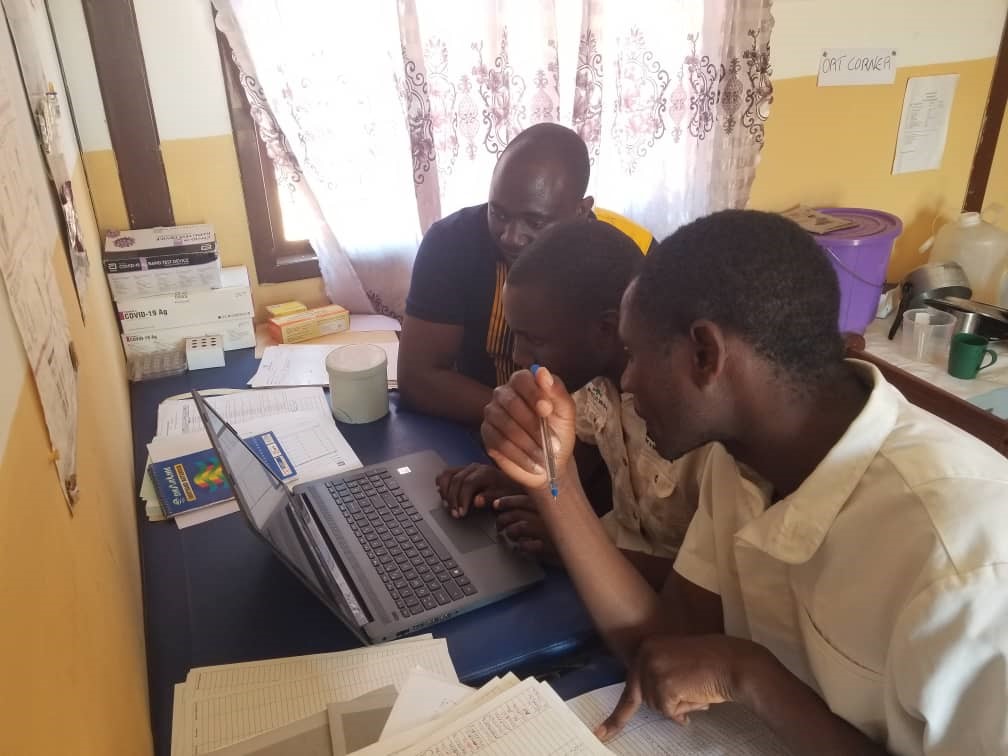The core issue of any public health intervention is its viability beyond the project’s lifespan. The eSCMIS project, funded by the U.S. Agency for International Development (USAID) and the U.S. President’s Emergency Plan for AIDS Relief, is implementing the Electronic Logistics Management Information System (eLMIS) in Zambia. The project has systematically implemented intrinsic processes that allow the Ministry of Health (MOH) to take over system ownership. This includes incorporating personnel from MOH into project work plans at all levels of implementation, such as software development, deployment, training, and technical support.
“I really like the system,” says Terence Shibwela, Biomedical Scientist at Mongu District Hospital in Zambia’s Western Province. “I believe it has a positive impact on how we serve our communities; I always want to make sure that facilities report on time so that they can be resupplied and have commodities to serve clients, especially in our rural areas.”

Terence Shibwela, Biomedical Scientist at Mongu District Hospital in Zambia’s Western Province conducting eLMIS on-the-job training.
Terrence Shibwela is a Ministry staff member who has been involved in project work since beginning his career as a biomedical technologist in Mongu District. “Within the first week of reporting for work, I had to learn how to use the system, I am now a biomedical scientist by profession, but I began as a biomedical technologist. I was initially assigned to the Mongu District Hospital, but because it had not yet opened, I was transferred to the Mongu Urban Clinic, where I worked in the lab. The eLMIS Facility Edition was still in its early stages, with only a few facilities using it. I quickly discovered that Mongu Urban Clinic was the only center reporting commodity reorders for more than 30 facilities in the district through the eLMIS Central Edition (CE) at the time, so the responsibility of reporting and ordering HIV and lab commodities for all facilities, including Mongu Urban Clinic, fell on me.”

Terence Shibwela, Biomedical Scientist at Mongu District Hospital in Zambia’s Western Province conducting eLMIS on-the-job training.
Sustainability has been a key implementation factor since the project’s inception. The project has engaged different levels of MOH staff in implementing the eLMIS system. Terence demonstrated a special aptitude for the system and was quickly recruited by the project to be trained and to join eSCMIS staff in field activities to learn all system management tenants. “I first encountered the eLMIS during my training in Tanzania, Zanzibar, so I was already familiar with it when I arrived in Mongu. One of the project staff orientated me within my first week, and within two weeks, I was very knowledgeable about its functions. I met all reporting deadlines for the facilities for which I was responsible. Soon after, I was called in for training to become a trainer of trainers at the project headquarters in Lusaka, followed by me accompanying project staff during system deployments in the Western and Northern provinces as the deployment of eLMIS FE was upscaled. I helped with networking, eLMIS infrastructure setup, and on-the-job training (OJT) for facility staff. It wasn’t long before I was taking the lead of some OJTs during deployments.
Terence has been working with the eLMIS since 2017 and has become a seasoned MOH eLMIS support officer. The eLMIS FE has now been deployed to over 150 facilities across Western Province and Terence provides technical support and supervision for the sites. “eLMIS is now part of my daily routine. What we must always remember is that for the public health system to function effectively, it must be viewed holistically. When I visit facilities, I always check in on how they are doing with the system, even if I’m there for unrelated reasons. For example, a few months ago I was conducting an HIV testing training at the district hospital in Sesheke, and while I was there, I checked in on their eLMIS system because this is our commodity reordering system; they wouldn’t be able to conduct the HIV tests without test kits, and they always need to make sure they are stocked up. I found they had system errors with users unable to log in, I managed to help them so they can get back to transacting with the system.”
“No one should have to travel many kilometers for medical help because their local facility lacks commodities,” Terence says. “I also recently assisted Mapungu Rural Health Center in Nalolo, which is over 250 kilometers from Mongu, where I am; getting there is difficult, especially when it is flooded. They had system errors due to late transaction updates and no training on how to make adjustments on expired commodities in the system, but I was able to assist the facility through AnyDesk, a remote desktop application installed on all eLMIS systems in facilities that allows you to access and control desktops, servers, machines, and devices remotely with the right credentials given to us by the project. The project’s resources are incredibly helpful.”
The eSCMIS project has trained over 100 MOH eLMIS super users and champions across the country, including Terence. They are embedded in project activities, assisting their respective districts and provinces, and even training other MOH personnel. Building capacity in MOH to manage the eLMIS is a top priority for the project. Our health workers’ efficiency is increased by digital capabilities, data analytics, and digital system support and deployment. To ensure sustainability, the project is constantly promoting system adoption and scalability, as well as building capacity in our health system.
“I believe that over time, all MOH commodity management staff will be considered super users of the eLMIS. The system is simple to use,” Terence says, “and it improves and streamlines our work. It has made the lives of supply chain managers easier; adopting the system is a no-brainer.”
